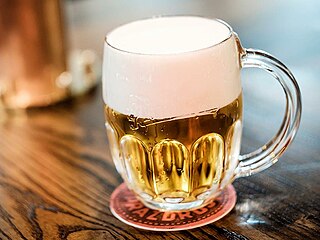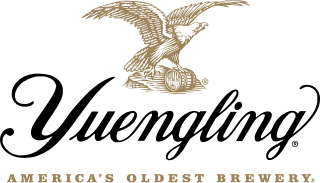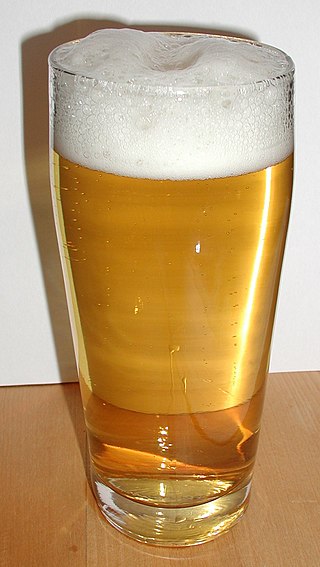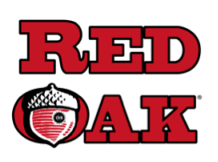
Bock is a strong beer in Germany, usually a dark lager. Several substyles exist, including:

Pilsner is a type of pale lager. It takes its name from the Bohemian city of Plzeň, where the world's first pale lager was produced in 1842 by Pilsner Urquell Brewery.

D. G. Yuengling & Son, established in 1829, is the oldest operating brewing company in the United States. In 2018, by volume of sales, it was the largest craft brewery, sixth largest overall brewery and largest wholly American-owned brewery in the United States. Its headquarters are in Pottsville, Pennsylvania. In 2015, Yuengling produced about 2.9 million barrels, operating two Pennsylvania facilities and a brewery in Tampa, Florida.

Pale lager is a very pale-to-golden-colored lager beer with a well-attenuated body and a varying degree of noble hop bitterness.
Big Rock Brewery is a Canadian public company and the largest brewery that is based in Calgary, Alberta, Canada. Additional brewing operations are located in Vancouver, British Columbia; Etobicoke, Ontario; and Liberty Village in Toronto, Ontario. Big Rock distributes a variety of beers and ciders throughout Canada.

Helles or hell is a traditional German pale lager beer, produced chiefly in Southern Germany, particularly Munich. The German word hell can be translated as "bright", "light", or "pale".

Pilsner Urquell is a lager beer brewed by the Pilsner Urquell Brewery in Plzeň, Czech Republic. Pilsner Urquell was the world's first pale lager, and its popularity meant it was much copied, and named pils, pilsner or pilsener. It is hopped with Saaz hops, a noble hop variety which is a key element in its flavour profile, as is the use of soft water. It is available in 330 ml, 355 ml and 500 ml aluminium cans and green or brown bottles.

Sprecher Brewery is a brewery in Glendale, Wisconsin, U.S. It was founded in 1985 in Milwaukee by Randal Sprecher, and is Milwaukee's first craft brewery since Prohibition. Sprecher produces an assortment of beers, flavored malt beverages, and craft sodas, and it is famous for its root beer.

Spoetzl Brewery is a brewery located in Shiner, Texas, United States. It produces a diverse line of Shiner beers, including their flagship Shiner Bock, a dark lager that is now distributed throughout the US. The brewery is owned by the Gambrinus Company, a family-owned company based in San Antonio, which also owns Trumer Brewery in Berkeley, California.

Beer is a major part of German culture. German beer is brewed according to the Reinheitsgebot, which permits only water, hops, and malt as ingredients; and stipulates that beers not exclusively using barley-malt, such as wheat beer, must be top-fermented.
Plzeňský Prazdroj, a. s., known in English as the Pilsner Urquell Brewery, is a Czech brewery opened in 1842 and headquartered in Plzeň, Czech Republic. It was the first brewery to produce pale lager, branded as Pilsner Urquell, which became so popular and was so much copied that more than two-thirds of the beer produced in the world today is pale lager, sometimes named pils, pilsner and pilsener after Pilsner Urquell. The brewery name, Pilsner Urquell, which can be roughly translated into English as "the original source at Pilsen", was adopted as a trademark in 1898. Pilsner Urquell is the largest producer and exporter of beer in the Czech Republic.
The International Brewing Awards, previously known as the Brewing Industry International Awards (BIIA), is a biannual brewing competition with its origins dating to 1886. It is believed to be the oldest international brewing competition in the world. The Awards are owned and organised by Brewing Technology Services Ltd (BTS). Only beers that pay to enter are judged.

Lager is beer which has been brewed and conditioned at low temperature. Lagers can be pale, amber, or dark. Pale lager is the most widely consumed and commercially available style of beer. The term "lager" comes from the German for "storage", as the beer was stored before drinking, traditionally in the same cool caves in which it was fermented.
Dundee was a Rochester, New York–based brewing company that produced ales and lagers. It was part of the Genesee Brewing Company, owned by North American Breweries which started marketing the brand's first lager in 1994 as J.W. Dundee's Honey Brown. Honey Brown quickly gained a good reputation and won awards, most notably the gold medal at the 2004 World Beer Cup.

Red Oak Brewery is a brewing company in Whitsett, North Carolina. Originally started as a brewpub in Greensboro, NC, Red Oak produces only unfiltered, unpasteurized Bavarian Style lagers. Red Oak beer is only distributed in North Carolina.
Sudwerk is a brewery in Davis, California. It has been crafting German-style lagers since 1989. It was a pioneer of lager in microbrewing, following the strict requirements of the German Reinheitsgebot, and it continues to specialize in craft lagers.
The Great Australasian Beer SpecTAPular, or GABS as it is commonly known, is a beer and food festival that celebrates the diversity and creativity of craft beer. It is run by The Local Taphouse beer bars each year in Melbourne and Sydney and in 2015, almost 23,000 people attended the events.
Brauhaus am Damm is a German micro-brewery, brew-pub and restaurant in Rustenburg, South Africa, overlooking the Olifantsnek Dam and Magaliesberg.
The Nashville Brewing Company originally operated from 1859 to 1890 in Nashville, Tennessee. It was later renamed the Gerst Brewing Company and operated until 1954. The brewery was revived in 2016 by beer historian Scott R. Mertie, who had written a history of the Nashville brewing industry a decade earlier.













